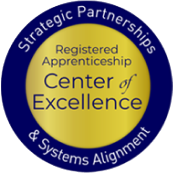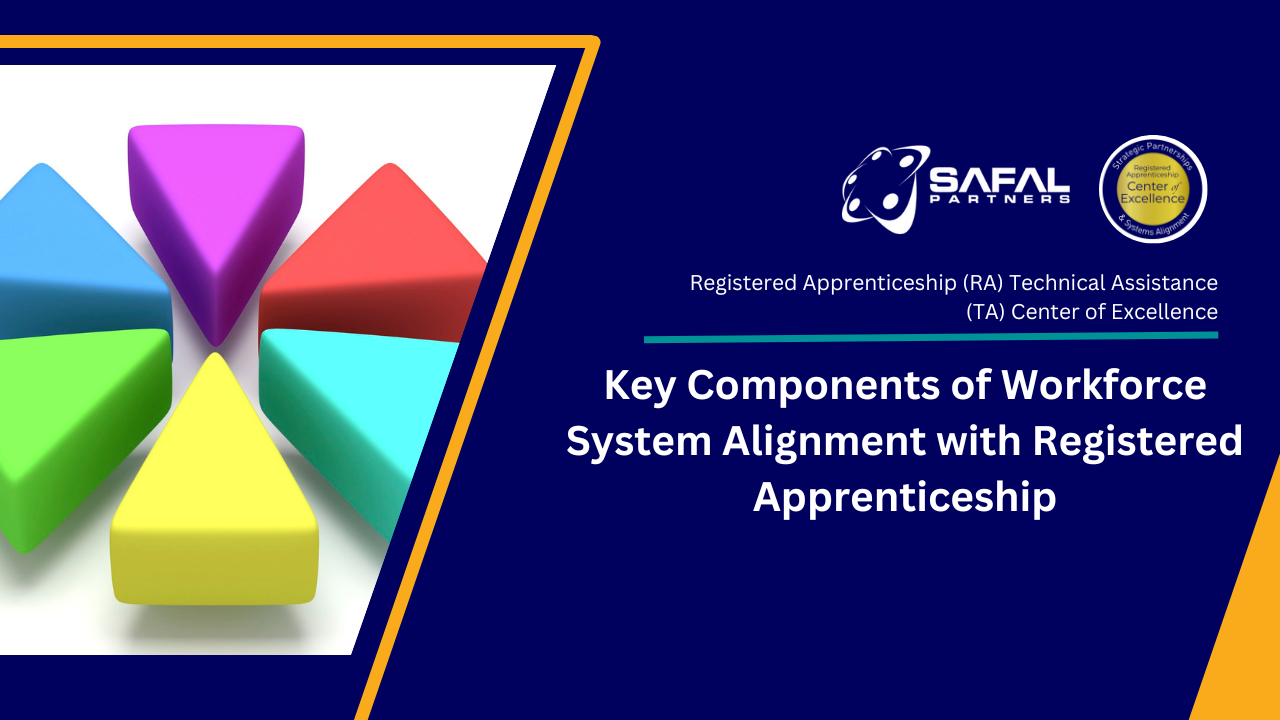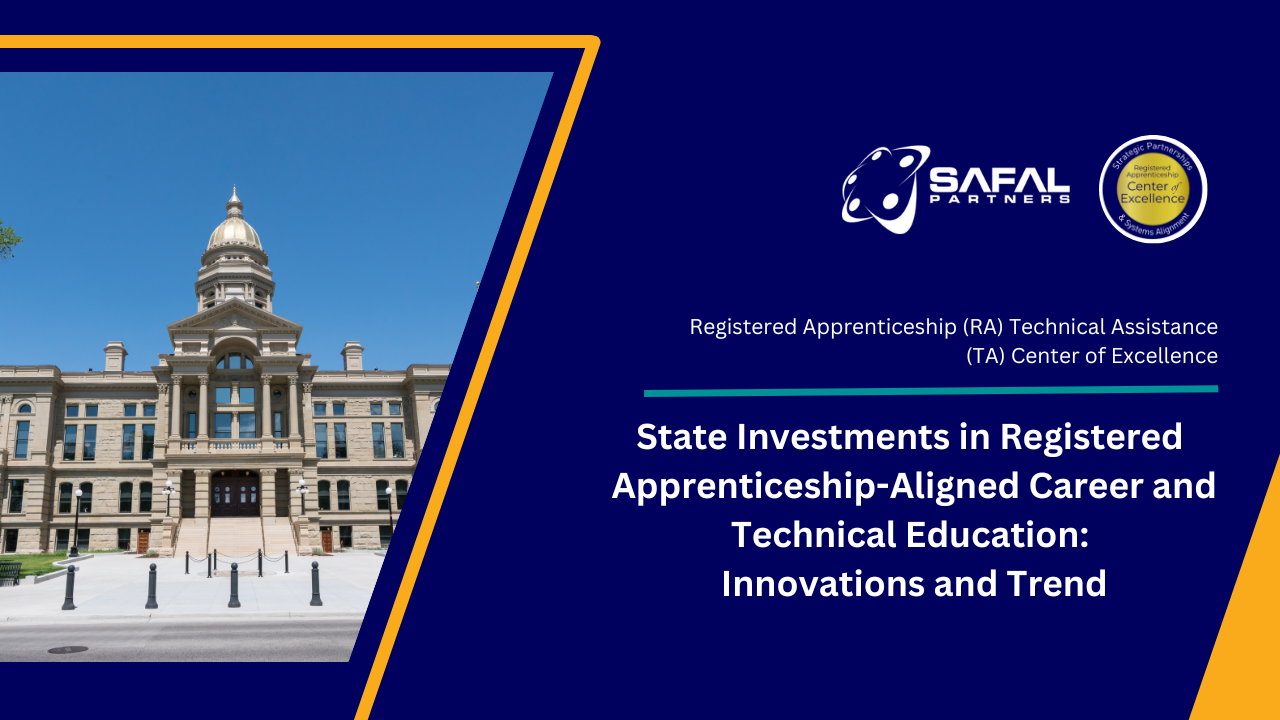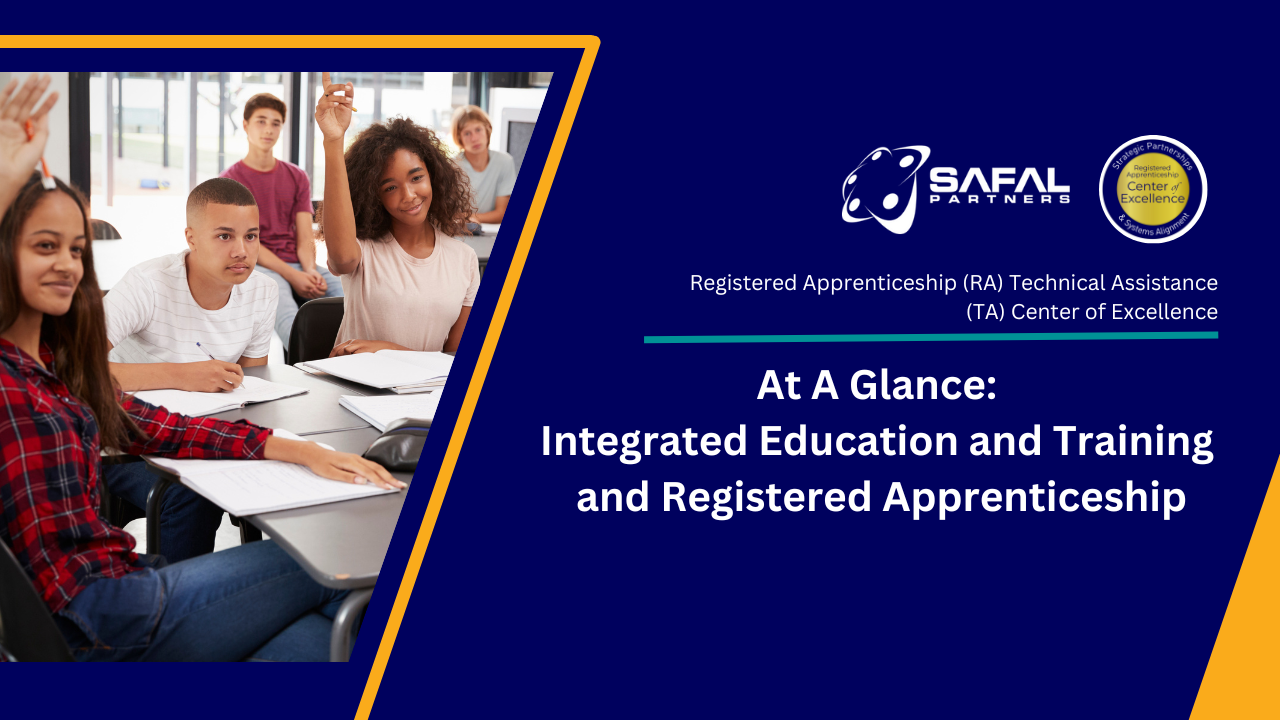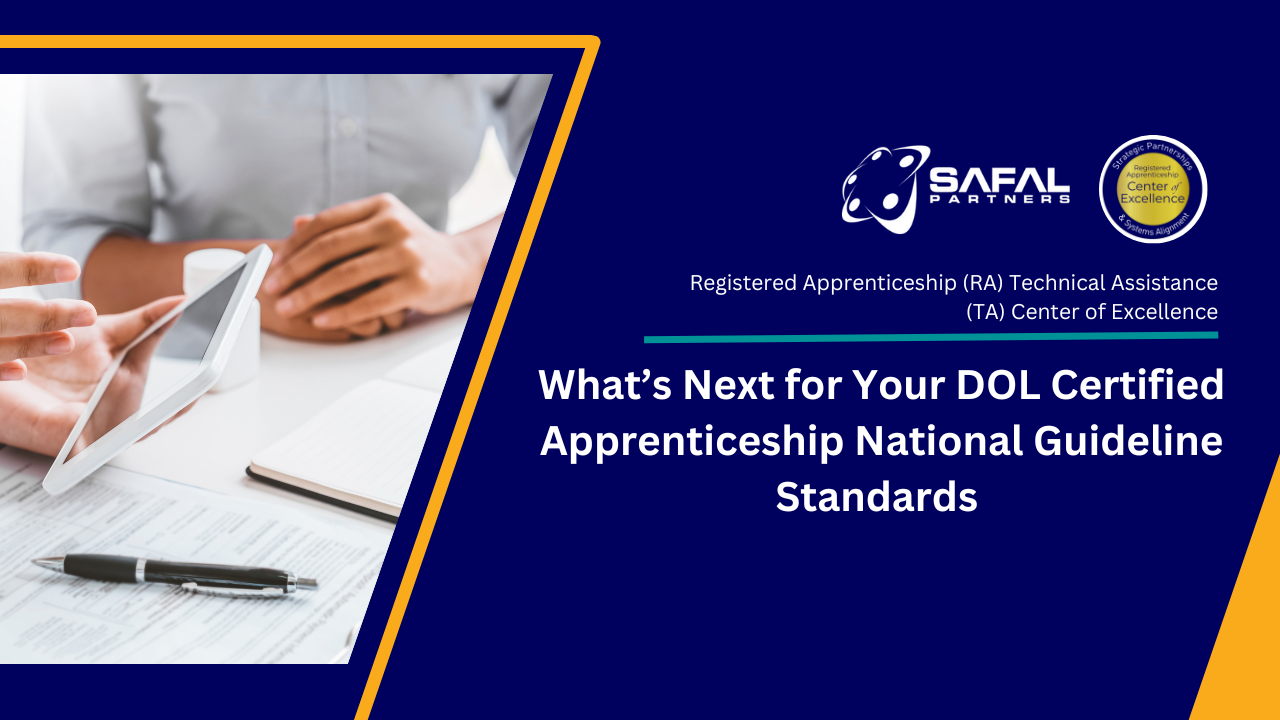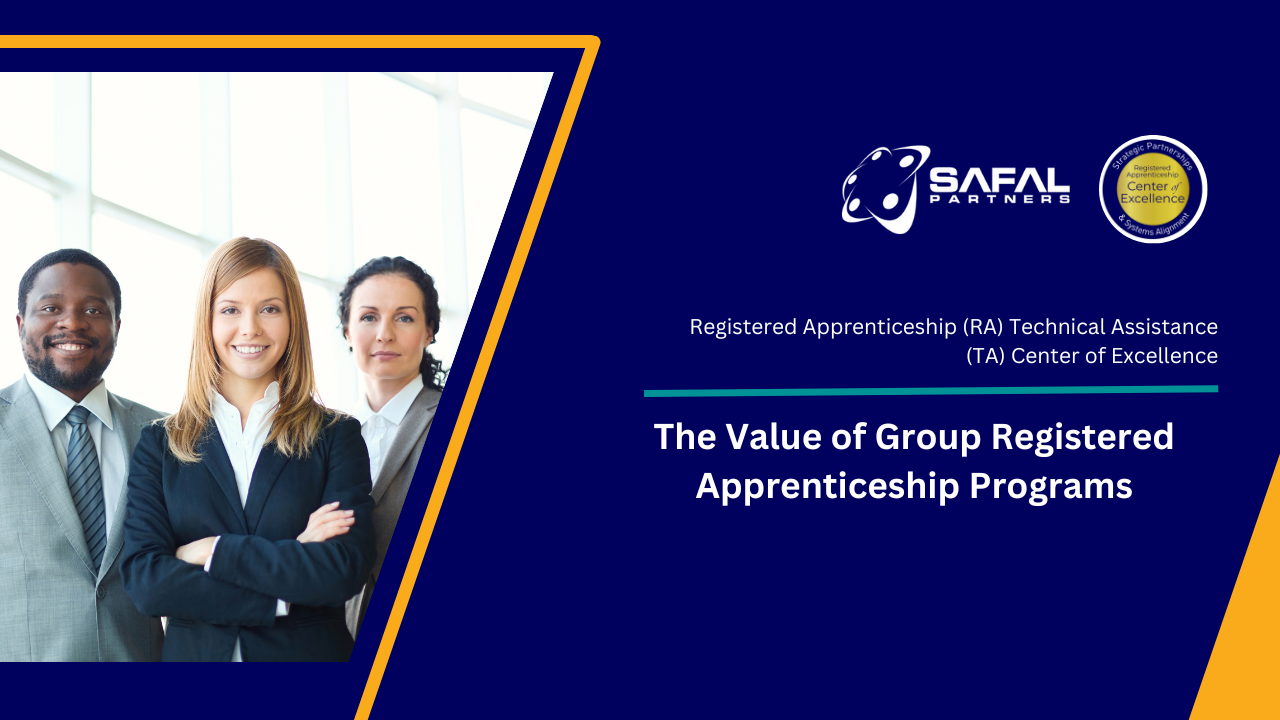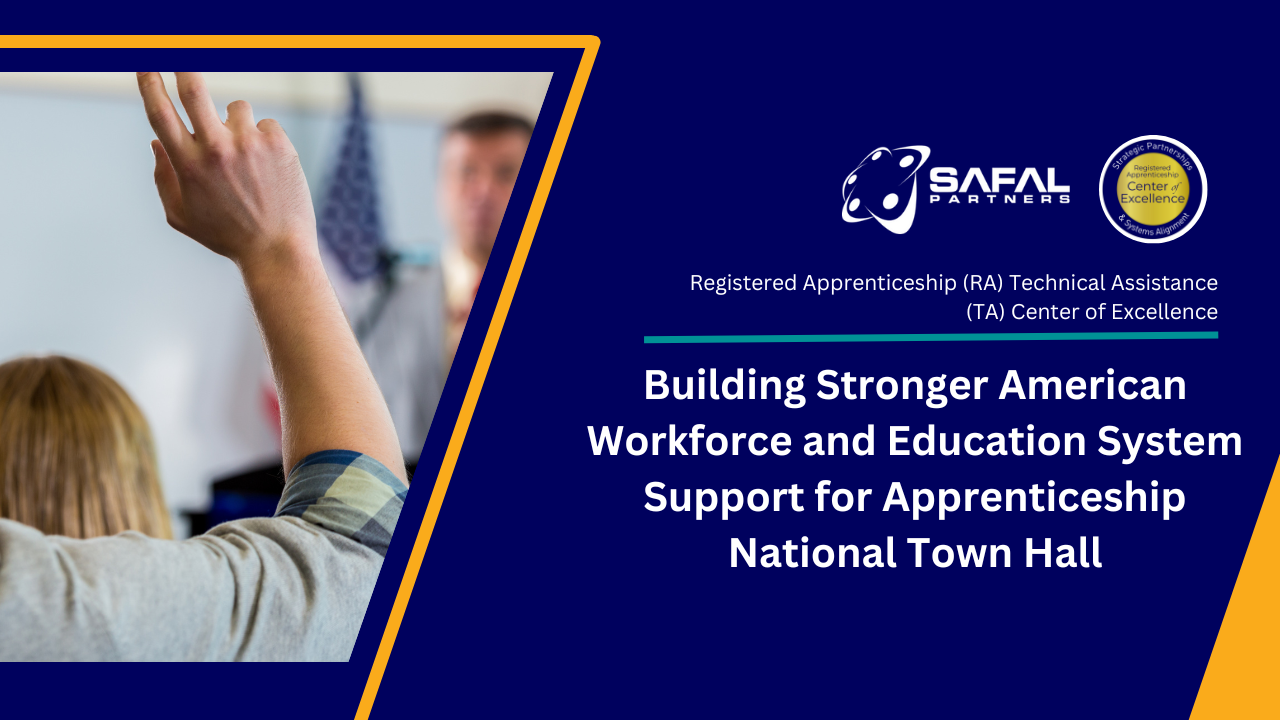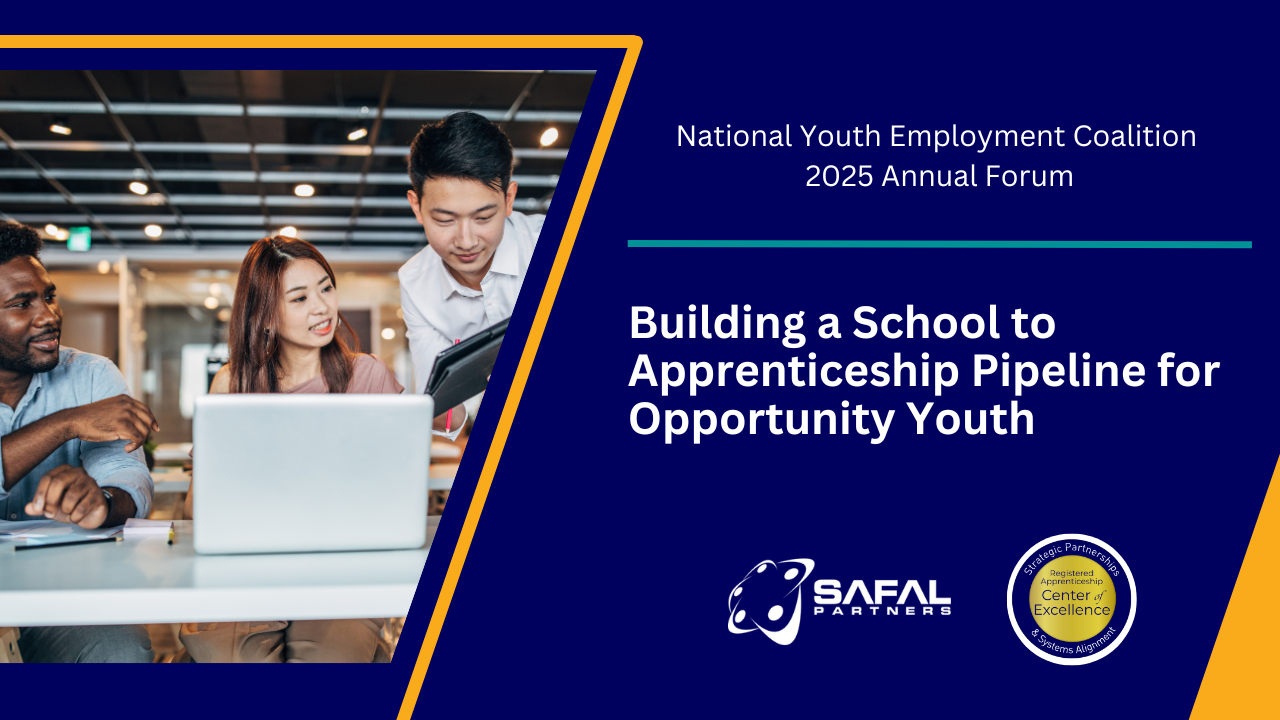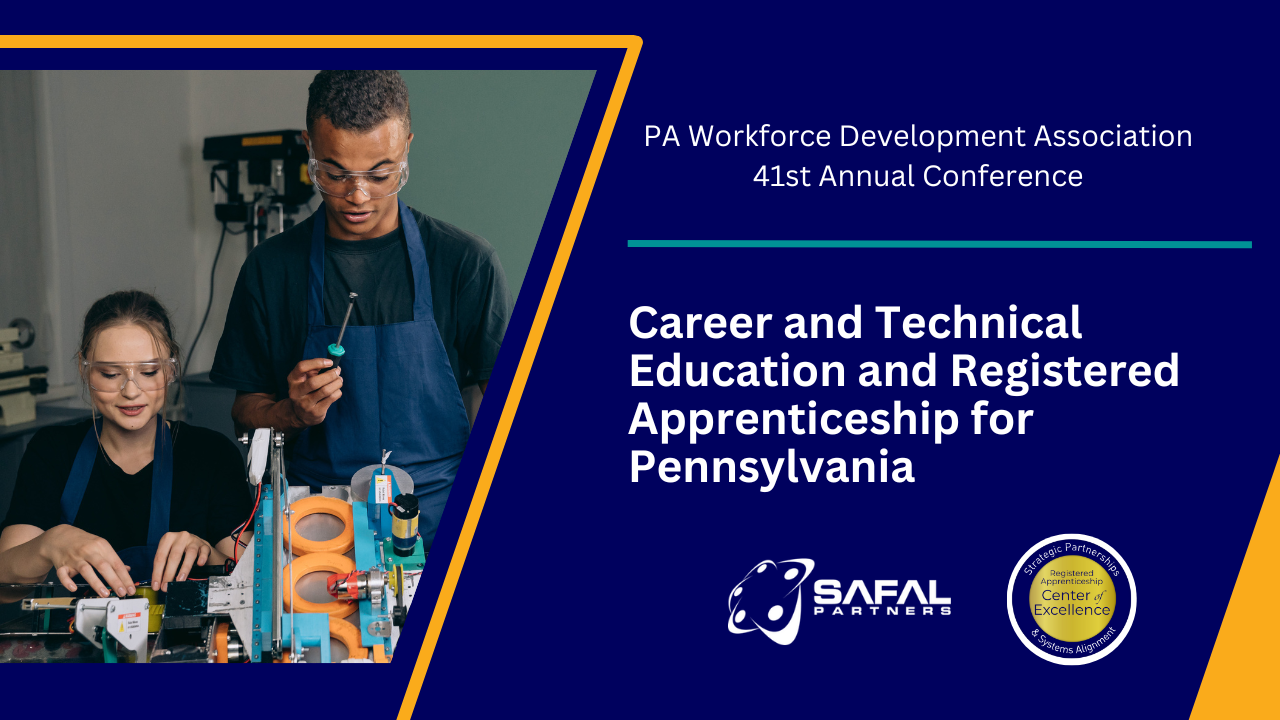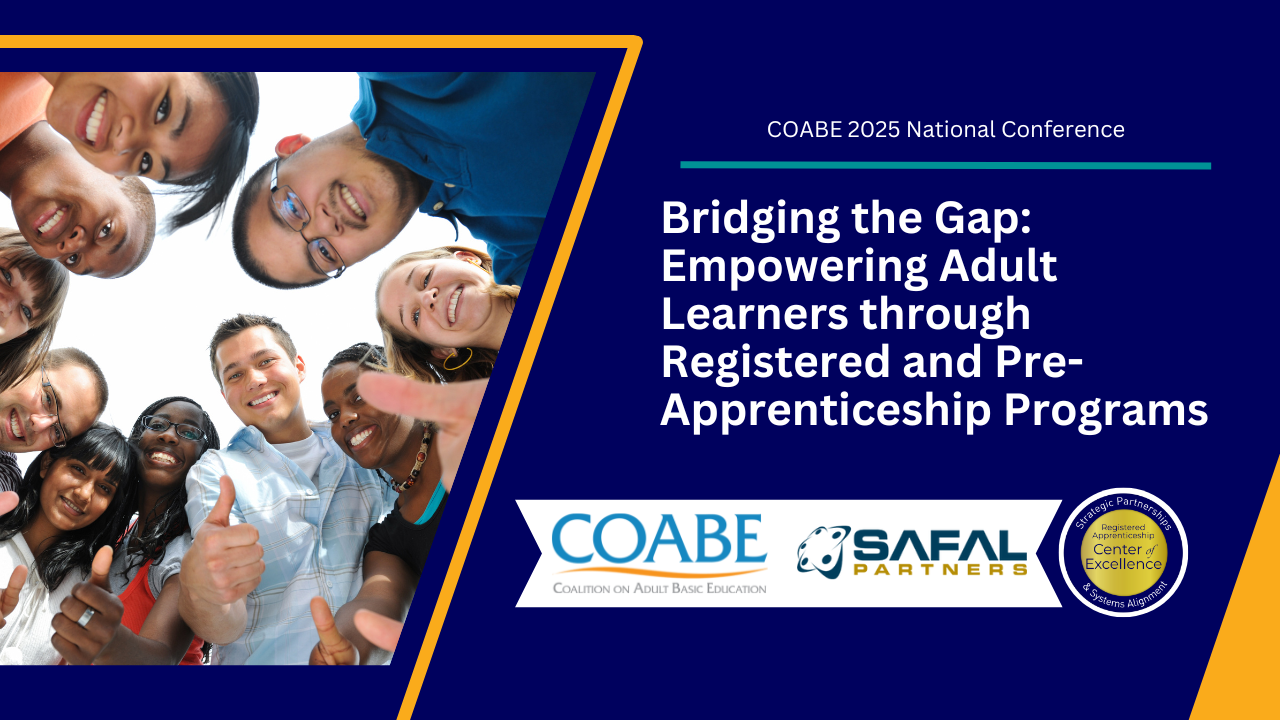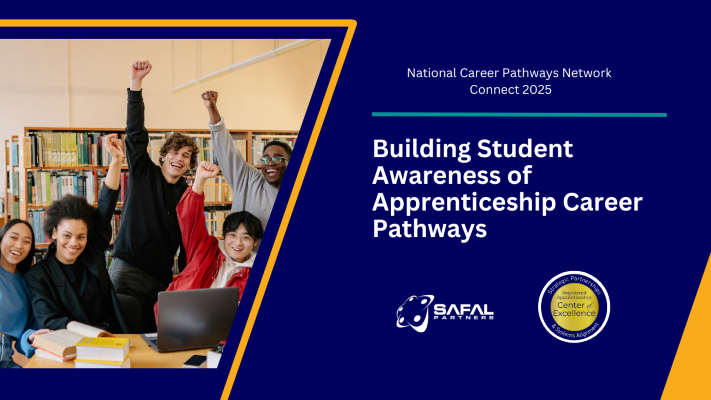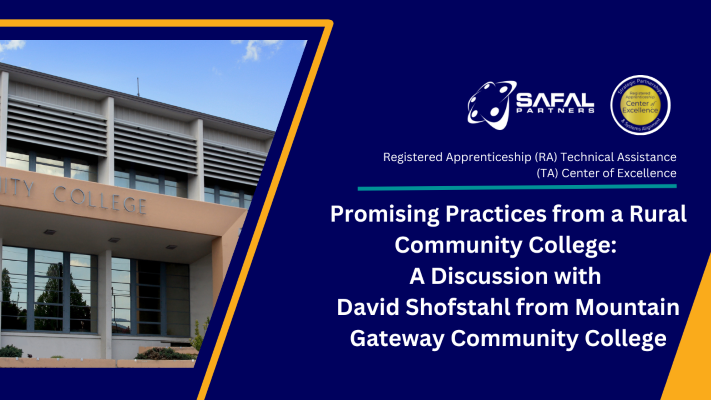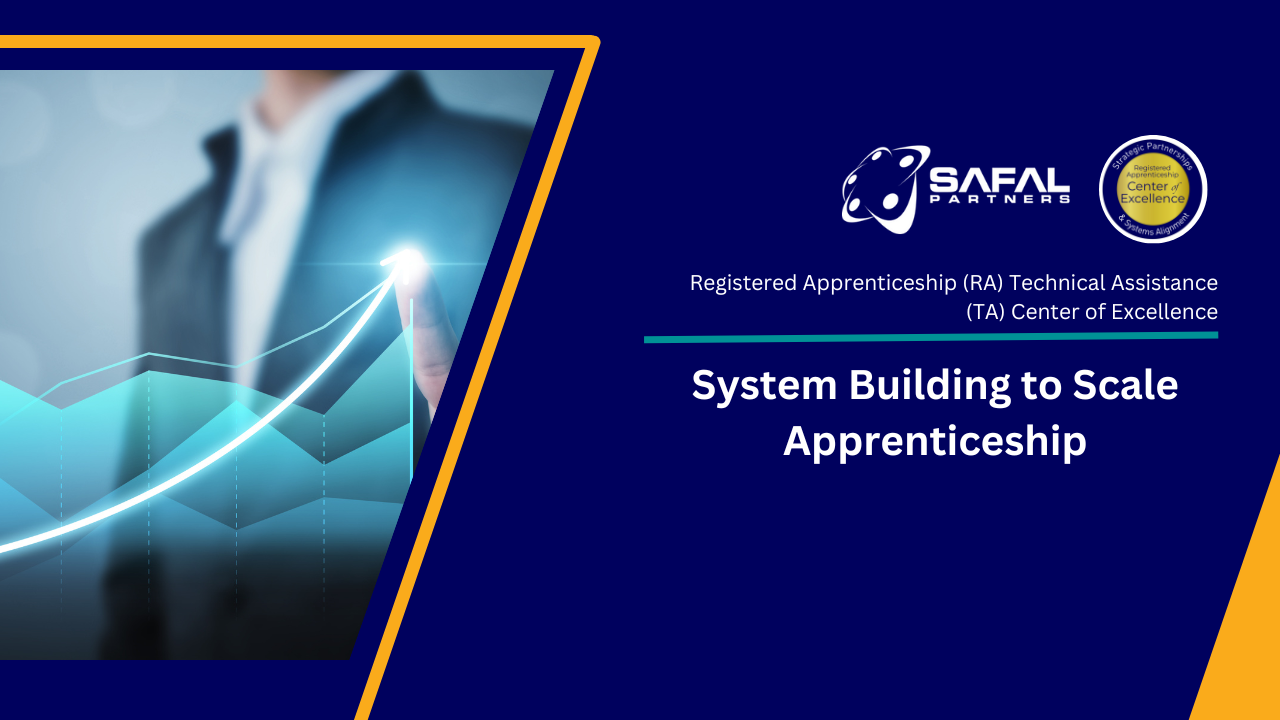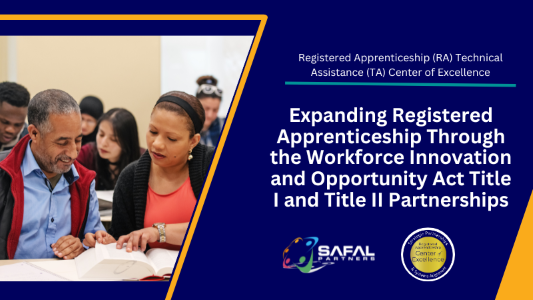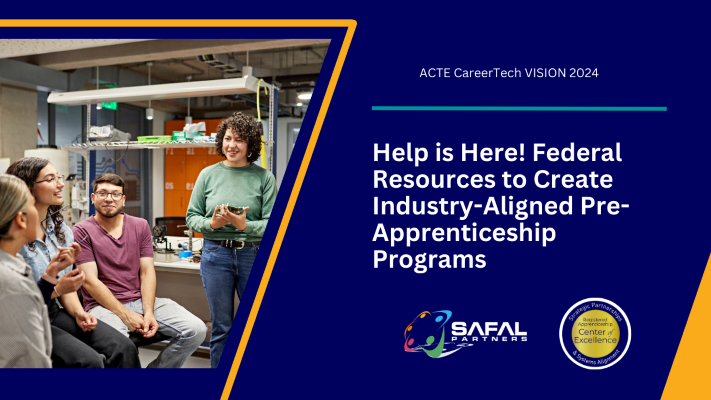This resource outlines and describes the key components of workforce system alignment with Registered Apprenticeship (RA). The document highlights six strategies for strengthening system alignment: adopting supportive policies that prioritize apprenticeship and streamline funding; embedding RA experts in American Job Centers to guide staff and job seekers; training Business Services Representatives to promote programs and engage employers; aligning data systems to improve sharing and policymaking; convening employers, educators, and partners to drive sector-based expansion; and, in some cases, having workforce boards or agencies directly sponsor apprenticeship programs to accelerate adoption and create more career pathways.
Bridging the Classroom to Careers through Apprenticeship
Registered apprenticeship (RA) provides your students with a proven pathway to high-demand careers across every sector. Related instruction delivered in-person, online or in a hybrid method is a key required component to all RA programs. These courses - which can be delivered in high school, through Career and Technical Education center programs, or community, technical colleges or universities - help students gain critically-needed knowledge to become competent professionals in their chosen pathway and earn one or more industry-valued credentials. Secondary and post-secondary educational institutions can participate in apprenticeship by:
- Becoming an RA sponsor, enabling local businesses to recruit your students for paid apprenticeship opportunities and/or enroll their incumbent workers and new hires into your courses for related instruction
- Serving as a training provider, delivering industry-aligned related instruction for local existing RA programs
- Being an intermediary, connecting students to local RA programs with recruiting, screening and testing services and even creating high-quality pre-apprenticeship programs to provide accelerated entry into a local RA program
Engage with the Center by:
- Viewing materials in our online repository (see below)
Resources
The Center produced this report to showcase how states are strategically aligning Career and Technical Education (CTE) with Registered Apprenticeship (RA). The report highlights trends such as funding initiatives, employer incentives, credential alignment, and data systems to strengthen talent pipelines and bridge education-to-employment gaps. By spotlighting innovative state policies and actionable examples, like tax credits and wraparound supports to stackable credential pathways, this resource equips apprenticeship stakeholders with practical models to scale robust, education-workforce aligned apprenticeship programs
The Center produced this user-friendly one-pager to clearly lay out the defining features, durations, pay structures, and credential outcomes of Integrated Education and Training (IET), Pre-Apprenticeship, and Registered Apprenticeship models—making it a practical tool for aligning and integrating these pathways to better serve adult learners. By spotlighting how IET and apprenticeship models complement one another, the document supports workforce and education leaders in building cohesive, flexible training strategies that accelerate entry into high-demand occupations.
Recognizing the importance of strategic rollout and adoption of National Guideline Standards (NGS), this tip sheet provides guidance on how to transition from approval to implementation. It offers practical steps for raising awareness, connecting with key stakeholders, and supporting partners in registering new Registered Apprenticeship (RA) programs using NGS. The tip sheet outlines best practices for marketing, partner engagement, and sustained support to increase the utilization of NGS as a scalable workforce development tool.
This resource explores group Registered Apprenticeship (RA) programs and how they can significantly enhance the reach and effectiveness of RA programs. Learn what a group RA program is and the benefits including efficiency, peer collaboration, and cost effectiveness when meeting workforce goals. Employers and organizations committed to building career pathways for students and career seekers are urged to use this resource to find a group sponsor or become a sponsor of a group RA program.
The U.S. Department of Labor’s Registered Apprenticeship Technical Assistance Center of Excellence on Strategic Partnerships and System Alignment hosted “Building Stronger American Workforce and Education System Support for Apprenticeship,” a national virtual Town Hall on advancing alignment of America’s apprenticeship, education, and workforce systems. This special event featured U.S. DOL leaders, Megan Baird, the Acting Administrator from the Office of Apprenticeship (OA), and Robin Fernkas, the Deputy Administrator from the Employment and Training Administration Office of Workforce Investment (OWI).
OA and OWI leadership was joined by the Center lead, Safal Partners, and its five partners - the National Association of Workforce Professionals, Coalition on Adult Basic Education, National Disability Institute, Wireless Infrastructure Association, and FASTPORT – in sharing insights from the field, lessons learned from the Center’s work over the past four years, and recommendations for future work.
The National Youth Employment Coalition conference unites youth practitioners, policymakers, youth leaders, and stakeholders dedicated to improving the lives of youth and young adults. By creating a collaborative space to share best practices, innovative ideas, advocacy strategies, and practical solutions to common challenges, the Forum works across geographies and sectors to empower each other in their mission to connect youth and young adults to workforce and educational opportunities.
Center Subject Matter Expert, Alan Dodkowitz, hosted an interactive workshop, Building a School to Apprenticeship Pipeline for Opportunity Youth, on May 12th at the Forum. Attendees heard about how to establish Registered Apprenticeship (RA) programs, conduct effective outreach to Opportunity Youth, and gain practical tools to bridge social services and the education system with the apprenticeship system. Attendees also learned how youth’s engagement in RA can improve WIOA grantees’ performance metrics and funding utilization.
The Pennsylvania Workforce Development Association (PWDA) serves as the voice of the Pennsylvania workforce development system and a clearinghouse for workforce development information statewide. They provide development and capacity building opportunities to workforce development professionals, local workforce development boards (WDBs), and other stakeholders while continuing proactive advocacy efforts on behalf of Pennsylvania’s workforce development system.
Safal Partners' Apprenticeship Senior Subject Matter Expert, Alan Dodkowitz, presented, "Career and Technical Education and Registered Apprenticeship (RA) for Pennsylvania." This session explored strategies for aligning RA with CTE pathways, ensuring that students gain hands-on work experience while gaining the necessary related instruction. Attendees learned how leveraging RA can enhance CTE programs by providing students with structured career pathways and heard best practices for building partnerships between educational institutions, workforce agencies, and employers to create seamless RA pipelines.
During the Coalition on Adult Basic Education 2025 National Conference, the Center of Excellence presented, Bridging the Gap: Empowering Adult Learners through Registered and Pre-Apprenticeship Programs. This presentation discussed the key challenges facing adult educators, such as transforming Integrated Education and Training (IET) into apprenticeships, engaging workforce partners, and leveraging Title 1 funding.
Pre-apprenticeship and Registered Apprenticeship programs offer adult learners an array of benefits, including access to employment and training in some of the fastest growing industries in this country. These programs also offer structured on-the-job learning (OJL) and related instruction (RI) that ensures adult learners have a pathway to earning industry-recognized credentials and long-term, well-paying careers. Through our work on the Center of Excellence, learn how Safal Partners can help develop pre-apprenticeship and Registered Apprenticeship pathways for adult learners by aligning our nation’s workforce, education, and apprenticeship systems.
The National Career Pathways Network (NCPN) is dedicated to improving the education-to-careers pipeline through professional development in career and technical education (CTE), Career Pathways, Adult Career Pathways, and workforce development. Center Subject Matter Expert, Alan Dodkowitz, presented the interactive workshop, Building Student Awareness of Apprenticeship Career Pathways, equipping both stakeholders and educators with tools to link Registered Apprenticeship (RA) programs and successful education-to-apprenticeship pathways. The session provided data showcasing the benefits of RA and a discussion around expert insights on effective transitions to apprenticeship.
The presentation also discussed how our Center of Excellence can provide state and local CTE leadership and program instructors with customized, no-cost TA, resources and tools to engage in pre-apprenticeship.
Rural community colleges face unique challenges when implementing Registered Apprenticeship programs. In this webinar, Safal Partners Workforce Director, Dr. Melissa Schroeder, hosted a discussion with David Shofstahl, Apprenticeship Coordinator and Workforce Program Manager for Skilled Trades at Mountain Gateway Community College (MGCC). As a recognized leader in workforce development, David has navigated unique challenges of implementing Registered Apprenticeship programs in rural areas. MGCC, the second smallest community college in Virginia, has utilized innovative approaches to overcome significant barriers to apprenticeship adoption. Dr. Melissa Schroeder also offers her insight into the challenges and opportunities facing community colleges.
Apprenticeships for America (AFA) hosted the 2025 AFA Summit featuring five plenary sessions, twenty breakout sessions, and a tech expo. The Summit focused on addressing timely issues facing apprenticeship, including sustainability and scaling, state and regional policy and practices, strategies for advancing success in apprenticeship, and the evolving roles of intermediaries. The conference also explored apprenticeship recruitment and pipeline development, the involvement of community colleges in apprenticeship, degrees and apprenticeship, and youth apprenticeship, as well as provided opportunities for participants to attend sector-focused sessions.
This presentation was presented at the Apprenticeships for America Summit and provided insights to national education, apprenticeship, and workforce leaders on closing the gaps between America's public workforce and Registered Apprenticeship systems to increase alignment.
The Workforce Development Institute 2025: Uncharted Courses was an opportunity to engage with thought leaders and innovators in workforce and economic development. Participants heard Center staff moderate an interactive panel discussion designed to provide insight for colleges looking to position talent and potential funding streams for RA in their communities. The panel included Anthony Cordova, Vice Chancellor of Workforce and Economic Development at California Community College; Marvin Martinez, Chancellor of Rancho Santiago Community College District; and David Shofstahl, Apprenticeship Coordinator at Mountain Gateway Community College.
Increased engagement between Registered Apprenticeship and Workforce Innovation Opportunity Act (WIOA) Title I and Title II programs and a deeper collaboration between these two complementary systems can contribute to the expansion of Registered Apprenticeship. Two recent surveys of workforce development and adult education providers conducted by the U.S. Department of Labor Registered Apprenticeship Technical Assistance Center of Excellence on Strategic Partnerships and System Alignment indicate that, while capacity exists among WIOA service providers to design and deliver pre-apprenticeship and Registered Apprenticeship programs, much more can be done to leverage these programs’ respective strengths for greater impact. This report provides a summary of the findings of these surveys and discusses opportunities for deepening the engagement of, and collaboration among, WIOA Title I and Title II service providers in supporting pre-apprenticeship and Registered Apprenticeship programs.
The Center presented this interactive workshop during ACTE’s CareerTech VISION 2024 to help employers of all sizes and all sectors expand their workforce recruiting and development strategies by adopting Registered Apprenticeship. Career and technical education (CTE) programs are expertly positioned to accelerate student’s successful entry into these programs through development of strategic partnerships and industry-aligned pre-apprenticeship programs. The Center also showcased how we can provide your state and local CTE leadership, and individual program instructors, with customized, no-cost TA, resources, and tools to engage in pre-apprenticeship.
